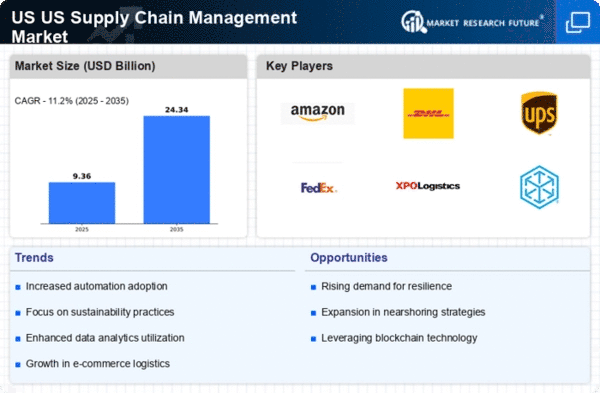The Supply Chain Management Market in the US is characterized by a dynamic competitive landscape, driven by technological advancements, increasing consumer expectations, and the need for operational efficiency. Major players such as Amazon (US), Walmart (US), and UPS (US) are at the forefront, each adopting distinct strategies to enhance their market positioning. Amazon (US) continues to innovate its logistics capabilities, focusing on automation and AI to streamline operations, while Walmart (US) emphasizes its extensive distribution network and partnerships to optimize supply chain efficiency. UPS (US) is investing heavily in sustainability initiatives, aiming to reduce its carbon footprint, which reflects a broader industry trend towards environmentally responsible practices. Collectively, these strategies contribute to a competitive environment that is increasingly focused on technological integration and sustainability.
Key business tactics within the market include localizing manufacturing and optimizing supply chains to enhance responsiveness to consumer demands. The competitive structure appears moderately fragmented, with several key players exerting significant influence. This fragmentation allows for a variety of operational models, enabling companies to differentiate themselves through unique value propositions. The collective influence of these major players shapes market dynamics, as they continuously adapt to evolving consumer preferences and technological advancements.
In December 2025, Amazon (US) announced the expansion of its drone delivery service, aiming to enhance last-mile delivery efficiency. This strategic move is significant as it positions Amazon (US) to capitalize on the growing demand for rapid delivery services, potentially reducing delivery times and operational costs. The integration of drone technology could also serve as a competitive differentiator in the increasingly crowded e-commerce landscape.
In November 2025, Walmart (US) unveiled a new initiative to enhance its supply chain transparency through blockchain technology. This development is crucial as it aims to improve traceability and accountability within its supply chain, addressing consumer concerns regarding product origins and safety. By leveraging blockchain, Walmart (US) not only enhances its operational efficiency but also strengthens consumer trust, which is vital in today’s market.
In October 2025, UPS (US) launched a new carbon-neutral shipping option for its customers, reflecting a growing trend towards sustainability in logistics. This initiative is strategically important as it aligns with global efforts to combat climate change and meets the increasing demand from consumers for environmentally friendly shipping solutions. By offering carbon-neutral options, UPS (US) differentiates itself in the market, appealing to eco-conscious consumers and businesses alike.
As of January 2026, current trends in the Supply Chain Management Market are heavily influenced by digitalization, sustainability, and the integration of AI technologies. Strategic alliances among key players are shaping the landscape, fostering innovation and enhancing operational capabilities. Looking ahead, competitive differentiation is likely to evolve from traditional price-based competition to a focus on innovation, technology, and supply chain reliability. Companies that successfully navigate these trends will likely emerge as leaders in the market, capitalizing on the growing importance of sustainable and efficient supply chain practices.

















